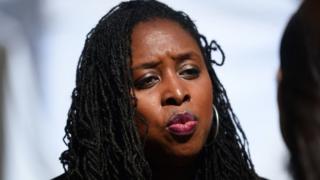 Image copyright
PA Media
Image copyright
PA Media
A Labour MP has accused police of racism after she was stopped while travelling in a car in east London.
Former shadow equalities minister Dawn Butler tweeted she had been pulled over in Hackney and had recorded the stop.
In an interview with the Guardian, the MP for Brent Central described how the experience showed "the system is institutionally racist".
The Met said the stop was a mistake caused by an officer incorrectly entering the car's registration number.
The car was being driven by a male friend who is also black, Ms Butler told the Guardian, and it was pulled over by two police cars.
She told the paper officers said the car was registered in North Yorkshire and took the car keys while checking the registration.
They then admitted there had been a mistake, that it was registered to the driver, and apologised, the Guardian reported.
'Ridiculous reason to stop'
In a video of part of the stop, which happened at about 12:00 BST on Sunday, she is heard telling the officers: "It is really quite irritating. It's like you cannot drive around and enjoy a Sunday afternoon whilst black, because you're going to be stopped by police."
She goes on to say: "If you are driving outside the area, I think that's a ridiculous reason to stop.
"If you are profiling people who are driving in a certain type of car, that's an inappropriate reason to stop, and if you are profiling people because of the colour of their skin, that's an inappropriate reason to stop."
One of the officers in the video tells her: "I appreciate everything you say and I do apologise for wasting your time."
In her interview Ms Butler told the Guardian: "It makes you realise that there's something really not right with the system."
Ch Supt Roy Smith tweeted earlier to say he had spoken to the MP who had "given me a very balanced account of the incident".
The Met Police officer added the force "are listening" to concerns she had about the police stop and the officers involved and she was "quite entitled to raise them".
In a statement the police force said: "Prior to stopping the vehicle, an officer incorrectly entered the registration into a police computer which identified the car as registered to an address in Yorkshire.
"Upon stopping the vehicle and speaking with the driver, it quickly became apparent that the registration had been entered incorrectly and was registered to the driver in London.
"Once the mistake was realised the officer sought to explain this to the occupants; they were then allowed on their way.
"No searches were carried out on any individuals."
The force said "one of the occupants" had been contacted by a senior officer and they had discussed "subsequent interaction as well as feedback regarding the stop".
It added: "We would welcome the opportunity to discuss this matter further with the occupants if they wish to do so."
The statement did not explain why the registration was entered in the first place.
'So unsurprising'
This week Ms Butler was named by Vogue magazine as one of the 25 most influential women for her support of Black Lives Matter protests.
She has previously described how her backing of the anti-racism movement had to threats on her office and staff and last month had to shut it for safety.
Former shadow home secretary Diane Abbott tweeted that Ms Butler's experience on Sunday was "so unsurprising".
Last month the Met apologised to GB sprinter Bianca Williams and her partner Ricardo dos Santos who were pulled from their car and handcuffed in front of their three-month-old son.
Nothing was found in the search and the Met referred itself to the police watchdog.
On Saturday, Ms Butler wrote in her Metro column that Met Commissioner Cressida Dick appeared "incapable" of tackling institutional racism in the police and called for her resignation.
The Independent Office for Police Conduct is investigating whether officers in England and Wales racially discriminate against ethnic minority people.
The latest official statistics for stop and search showed a disparity rate of 4.3 for all black, Asian and minority ethnic people and 9.7 for black people.
The BBC has contacted Ms Butler for comment.